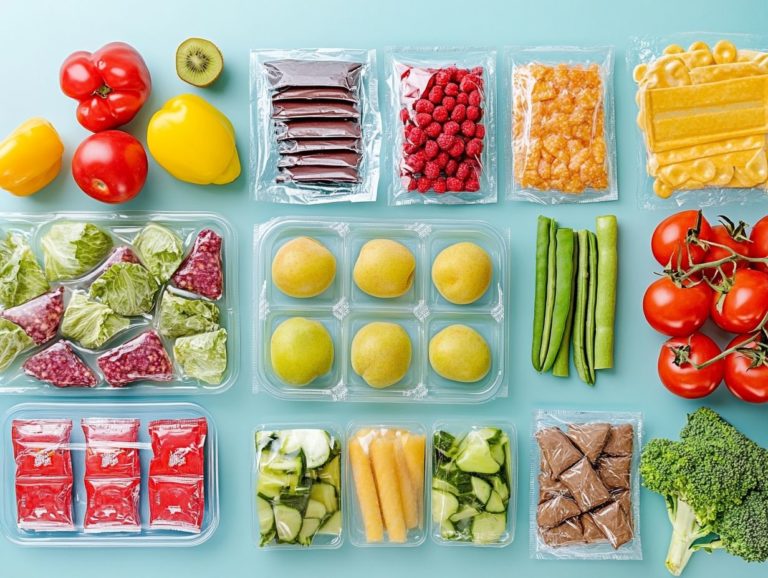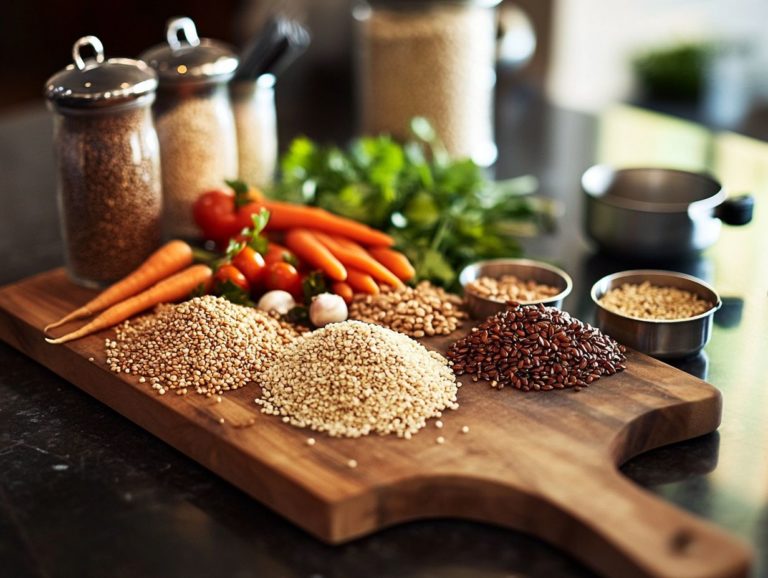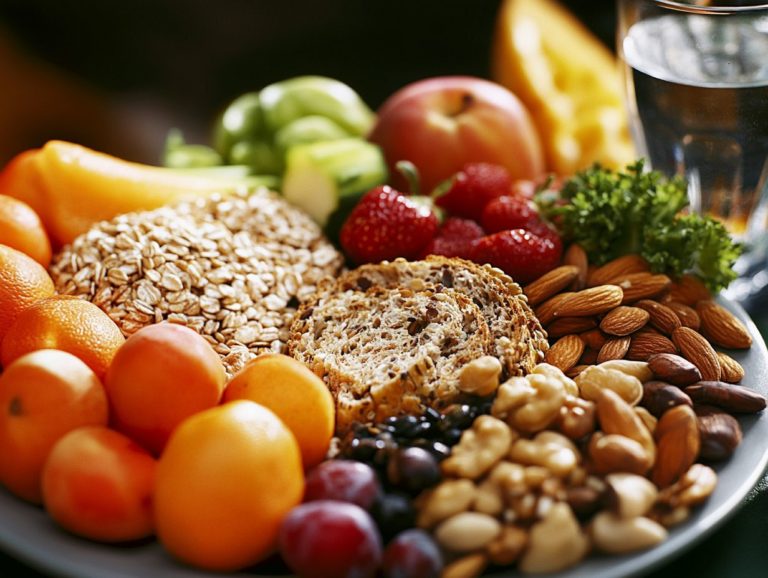Is Snacking Healthy or Unhealthy?
Snacking has woven itself into our daily eating habits, igniting a spirited debate about its health implications. On one hand, snacking can effectively manage hunger and provide an energy boost. On the other hand, there are valid concerns regarding the potential dangers of unhealthy choices. This article will delve into the pros and cons of snacking, shed light on the benefits of selecting nutritious options, and offer practical tips for making healthier snack selections. We will also explore how to satisfy your cravings with alternatives to snacking. Let’s dive into this deliciously contentious topic!
Contents
Key Takeaways:
Snacking can be healthy or unhealthy depending on the type of snacks consumed and portion sizes.
Healthy snacking can provide important nutrients and help prevent overeating at meals.
Unhealthy snacking can lead to weight gain and negative health effects.
To make snacking healthier, choose nutrient-rich options like fruits, vegetables, and whole grains, and avoid highly processed, high-calorie snacks.
The Debate on Snacking
The conversation around snacking often revolves around its place in our diets, with contrasting views on its health implications. The types of snacks you choose can significantly influence your overall dietary intake. Some experts advocate that snacking can be beneficial, boosting energy levels and helping you stay satisfied between meals.
However, it’s crucial to heed the warnings about unhealthy snacking habits, especially those involving processed snacks that are high in calories. These can contribute to unwanted weight gain and a host of health issues. By grasping both perspectives, you can develop better snacking habits while keeping dietary guidelines in mind.
Arguments for and Against Snacking
There are compelling arguments both for and against snacking, particularly when you consider the types of snacks you indulge in and their nutritional quality. On the positive side, incorporating healthy snacks into your diet can elevate your energy levels and help you manage hunger more effectively throughout the day.
Opting for whole foods like fruits, nuts, and yogurt not only provides essential nutrients but also keeps those pesky cravings at bay. However, you must also weigh the downsides. Snacking can quickly spiral into overeating, especially if you gravitate toward processed options packed with sugars and unhealthy fats.
Emotional eating can further complicate matters, leading you to reach for comforting snacks during stressful times rather than choosing nourishing alternatives. Thus, the relationship between snacking and overall health becomes a delicate balance of choices that you navigate every day.
Benefits of Healthy Snacking
Healthy snacking presents an array of benefits, particularly in maintaining energy levels, promoting satiety, and supporting effective weight management. By choosing nutritious options like fresh fruits, low-fat dairy, and nuts, you can satisfy your cravings while enhancing your dietary intake.
These nutrient-rich snacks not only appease hunger but also help you keep your calorie consumption in check, preventing the unhealthy weight gain that often accompanies high-calorie processed foods.
Nutritional Value and Satiety
The nutritional value of healthy snacks is key to promoting satiety and managing calorie intake, making them an essential component of a well-rounded diet. When exploring a variety of healthy snack options, it’s crucial to understand that each choice comes with its own unique nutrient profile tailored to your dietary needs.
For example, a handful of almonds offers healthy fats and protein, which can help you feel fuller for longer. On the other hand, fresh fruits provide essential vitamins and hydration, all while being lighter on calories.
Don t overlook portion sizes; even the healthiest snacks can contribute to excessive calorie consumption if consumed without awareness. Adopting the practice of mindful eating savoring each bite and tuning into your hunger cues can be an invaluable strategy. This approach enhances your satisfaction and helps curb the urge to overindulge.
We d love to hear your tips or thoughts on healthy snacking! Share your ideas with us!
Risks of Unhealthy Snacking
Unhealthy snacking poses risks that can lead to weight gain and health issues. These affect both your physical and mental well-being.
Indulging in high-calorie, low-nutrient snacks can have serious consequences. The easy availability of processed snacks can disrupt your diet and lead to poor health.
This is especially important for children, as they are developing their snacking habits.
Impact on Health and Weight
Unhealthy snacking can significantly impact your health and weight. It often leads to increased calorie intake, resulting in weight gain and health issues like obesity.
Nearly 90% of people struggle to maintain a balanced diet due to frequent unhealthy snacking. Emotional eating often drives this struggle, as many reach for comfort foods during stress.
Studies show that emotional eaters consume about 40% more calories when facing negative emotions than those who eat mindfully. This cycle of poor choices can heighten feelings of guilt and anxiety.
Considering these factors, maintaining a healthy lifestyle can feel like a tough challenge.
How to Make Snacking Healthier
To snack healthier, start by choosing nutritious snacks and watching your portion sizes. Embrace mindful eating to enhance satisfaction and avoid overindulgence.
Opt for wholesome choices like fresh fruits, low-fat dairy, and nuts. These create a balanced snacking strategy that boosts your diet and energy.
Tips for Choosing Nutritious Snacks
When selecting nutritious snacks, consider portion size and ingredient quality. Read labels and choose snacks with whole, recognizable ingredients.
Avoid snacks filled with artificial additives and sugars. Choosing whole foods like fruits, vegetables, nuts, and seeds provides essential nutrients and helps satisfy hunger.
Balance proteins, fats, and carbohydrates to maintain energy and support health. Mindful eating savoring each bite enhances your snacking experience for greater satisfaction.
Alternatives to Snacking
Exploring alternatives to traditional snacking can satisfy cravings without unhealthy options. Try hydrating with water, exercising, or choosing low-calorie foods to manage hunger.
This strategy helps you stay in control and allows for enjoyable healthy snacks when needed.
Other Ways to Satisfy Cravings
You can satisfy cravings without unhealthy snacks using behavioral strategies. For example, when a craving hits, drink a glass of water. It can often tame hunger while keeping you hydrated.
Engage in hobbies as a delightful distraction. Immersing yourself in activities can redirect your focus from the urge to snack.
Mindful eating is another effective tool. Focus on savoring each bite and tuning into your body’s hunger signals to create a healthier relationship with food.
These strategies help curb emotional eating, guiding you toward nutritious choices for long-term well-being.






